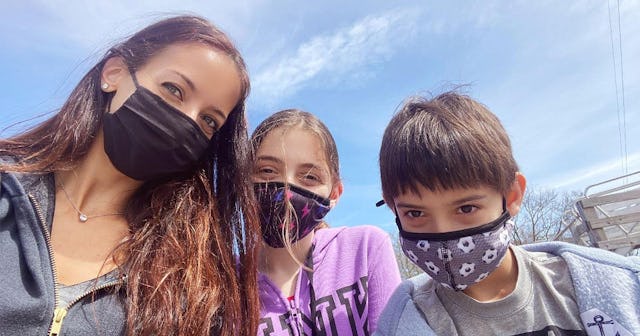I'm Learning To Embrace The 'And' — Here's What That Means

“And” is such a tiny word. In any given essay, it’s littered throughout the paragraphs. We all probably write and speak the word “and” thousands of times a day and rarely give the word much thought.
But when you think about it, “and” is actually a really powerful word. It’s a connector. It’s a space-maker. It allows two contradictory ideas or thoughts or moments to exist at once.
Let me explain. I recently saw a post about the gift of being your spouse’s person at the end of life and recognizing that being that person was a trauma to you. The statement struck me. I paused my mindless late night social media scrolling and considered what that statement meant.
I was with my husband every day of his illness. I was with him when he died. Being his person, even on the hardest days when I had nothing left, is something I would never change. I am forever grateful that I could be there for him, forever honored that he trusted me enough to be with him during those last moments. I am deeply thankful that he died knowing he was loved and always would be loved.
Courtesy of Elaine Roth
For three years, I’ve stopped there—at my gratitude. I didn’t want to examine the feeling that existed beside the gratitude. That caregiving, sitting vigil over a deathbed, all of it, exacted a high price that I’m still paying. That it broke me down. That giving when I had nothing left, left scars along my heart and soul that I’ll bear forever.
This post I came across put that gratitude in words, and then added the word “and.” It was eye opening to be told that I didn’t have to choose. Feeling traumatized by it all does not cancel out the gratitude, and vice versa. Doing all that I’d done for him was an honor and I paid a high emotional price. It’s that simple.
Courtesy of Elaine Roth
The “and” is powerful. The “and” allows both my truths to co-exist, which allows me to exist more wholly. The “and” gives me permission to hold two contradictory ideas without judgment. I can be grateful to have been there, unwilling to give up even a moment of it, and make space for the fact that being there was hard and broke down parts of me I know I won’t be able to get back.
The idea of “and” isn’t limited to caregiving and loss, though. It’s prevalent in so many places of our lives. The more I thought about it, the more I began to apply it to other parts of my life. For example, I’m so grateful that I can be my kids’ safe space in this world, and it’s exhausting to be their human comfort item. Or, I would give anything to go back to my old life as a wife to my husband, and I’m so proud of what I’ve built during widowhood. Or even, I know everyone is doing the best they can and deserves grace, and I want to scream “do better” at a lot of people. (The one might be too general, but it works.)
Courtesy of Elaine Roth
The “and” gives us permission to fill in the part that we might try to hide because it’s the part of us that isn’t as compassionate and composed as we’d like. Often, after the “and” comes the part of us that’s uglier. It’s also the part of us that’s human. The “and” allows us to be multi-dimensional: imperfect and perfect, selfish and selfless, full of grace and full of you-can’t-be-serious eyerolls.
On the other side of the spectrum—or maybe right alongside it—is the idea that “and” is a chance to find forward movement. Recently a friend did something that hurt me. It’s not the first time this friend acted in a way that hurt my feelings. My initial reaction was hurt and anger. Both are emotions that need space and shouldn’t be brushed under the metaphorical rug or muted for anyone else’s comfort, but I also took a moment to add an “and.” The “and” was not to invalidate what I felt, but a chance to not get stuck in what I felt, to find forward movement in those difficult feelings. Instead of “I’m hurt,” I kept the sentence going. I landed on: I’m hurt, and it’s time to redraw the boundaries on this friendship. The “and” was at once something that grounded me in the moment and encouraged me to take a step forward.
Courtesy of Elaine Roth
And is important. It’s one of the first words we learn to read, but it’s not as elementary as it first appears. And is a difficult concept to wrap our minds around. And can be the difference between living your full truth or not. Between stopping your sentence or finding more.
And is a word I’m learning to embrace, because my story is multi-dimensional and propelling forward.
This article was originally published on